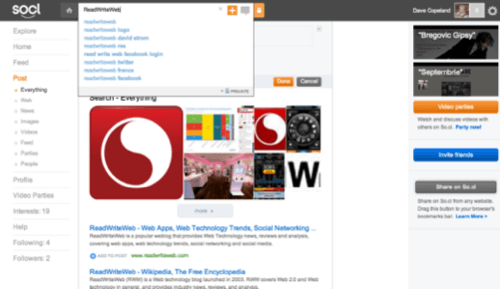When it comes to search strategy, Google and Facebook both seek to give users the best possible result. While Google will continue to trust technical data over social data, though, Facebook is likely to stake the success of its search engine – and perhaps the entire company – on a new kind of search that puts social context first.
Mark Zuckerberg told the TechCrunch Disrupt conference earlier this month, “Facebook is pretty uniquely positioned to answer a lot of questions people have.” His words set off a maelstrom of speculation that the company was about to – finally – go toe-to-toe with Google in search. Coupled with the company’s dismal stock performance since its initial public offering in May, Zuckerberg’s comments have persuaded many observers that a Facebook search engine will be available sooner rather than later.
But it could be an entirely different search engine than that of Google and the myriad copycat competitors that have tried to dent Mountain View’s massive market share. While Google crawls the Web and combines what it finds with your search history to find the best result based on your query, Facebook search engineers would probably try to customize search results based on everything the company knows about your preferences and those of your friends.
“Facebook’s value . . . is the enormous set of data they have about you,” said Christophe Henner, a social media manager focusing on Facebook technologies for X-Prime Group, a French Web technology firm. “Facebook would focus on improving search results not based on a page by itself – incoming links, authority and content – but on its social context: Did one of your friend engaged with the website or with this specific page?”
Facebook As A Decision Engine
For Facebook search to succeed, it needs to be more than a site that simply says “Your friend liked this sushi restaurant, so maybe you will too.” Eric Silver, founder of content management system maker WebKite, said Facebook will use a complex analysis of its social graph to push you toward the decision that’s best for you.
“The way search has evolved, we’re seeing engines that are focused on delivering tailored results or helping users to make decisions,” Silver said. “Google is getting their toes wet by offering credit card comparisons at google.com/advisor, but I think we’ll see something more powerful and comprehensive from Facebook. Facebook will be able to learn from your decisions and the decisions made by peers to better answer search questions and provide results that users want.”
Another way to think of Facebook search is to see it as a problem-solving engine, according to Ben Romberg, social media director at search marketing firm Tug Media. Zuckerberg’s remarks “suggest that search terms will relate to problem solving, or asking a wider audience as well as your friends to generate information: ‘I’m looking to buy a new computer, anyone have any suggestions?’” Romberg said.
Bonding With Bing?
It’s unclear whether Facebook would end its partnership with Microsoft, which has been using social data from Facebook to improve its search results (and thus differentiate its search results from Google’s). Facebook could leverage Bing’s head start in attacking Google’s market share, but it may also view Microsoft as a competitor or see Bing as more a hindrance than an asset.
Microsoft itself seems not to have a bead on Facebook’s direction. Even as it continues to tout Bing’s partnership with Facebook, it continues to work on So.cl, a social search engine.

“Facebook would need a lot of time before its index would be big enough to provide a good service,” Henner said. “Microsoft can’t get the upper hand alone, and Facebook needs a little push forward before being able to compete with Google.”





















